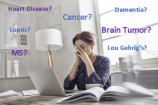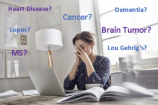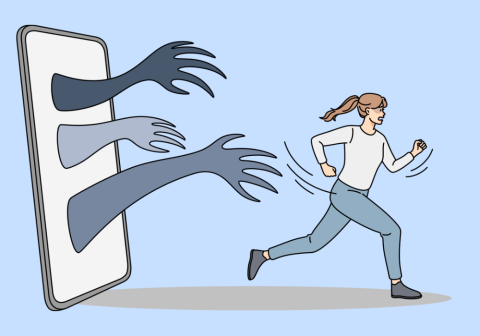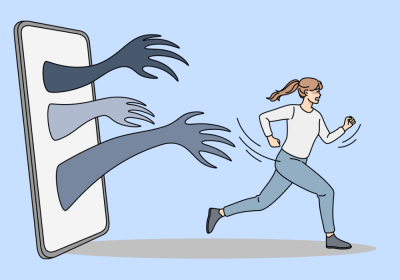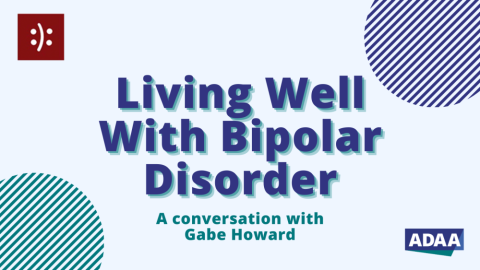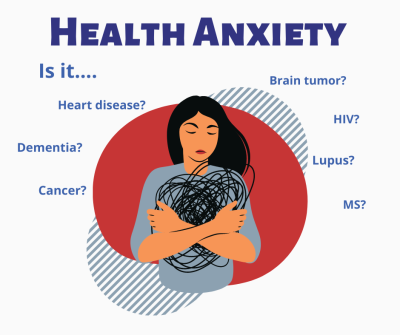 What is Health Anxiety?
What is Health Anxiety?
Health anxiety is a fear and preoccupation with the belief that one has, or is in danger of developing, a serious illness like cancer, ALS, or a heart attack. It involves the misinterpretation of normal bodily sensations as dangerous. Healthy bodies produce all sorts of physical symptoms that might be uncomfortable, painful, unexpected, and otherwise unwanted — but not dangerous.
Normal physical symptoms that often produce fear and worry include changes in visual acuity, heart rate and blood pressure, saliva levels, depth of breathing, balance, and muscle tone, to name a few. When a person misinterprets a new growth on the skin, a headache, a muscle twitch, or change in bowel movement color as a sign of a fatal disease it creates undue worry. The physical sensations are real, but they are not necessarily symptoms of a fatal disease. Many people with health anxiety are often unable to function or enjoy life due to their fears and preoccupations.
Difference Between Health Anxiety and Anxiety
Symptoms of anxiety produce very real physical symptoms: Dizziness, stomachaches, rapid heartbeat, tingling in the hands and feet, muscle tension, jitteriness, chest pressure, and the list goes on. These symptoms add fuel to the fire. Now you have real evidence that something is seriously wrong. Or do you? Perhaps it’s anxiety. So how do you know if these symptoms are serious? You go to the doctor…and then to a therapist.
Health anxiety persists despite reassurance from the doctor. Seeking reassurance from doctors, insisting on repeated medical tests, and visits to the ER and urgent care are common if you have health anxiety. This habit leads you to rely on such reassurance to obtain relief from health worries. A vicious cycle develops of noticing a sensation or learning of an illness in the world, misinterpreting it as threatening, Googling your symptom and learning about fatal diseases, becoming increasingly anxious as you compulsively check your symptoms, and finally going to the doctor for reassurance. Reassurance from the doctor can reduce the anxiety and brings relief temporarily but soon the cycle starts again with a new symptom.
People with health anxiety may also avoid going to the doctor due to a fear of learning they have a terrible disease, the possibility of having to do medical tests, or being triggered by something the doctor says. The entire experience creates a lot of anxiety which is something people with illness anxiety would rather avoid.
Finding Help: Treatment
Prior to treatment for health anxiety, medical problems must be ruled out with a thorough physical exam.
Mental health treatment should help you recognize that intolerance of uncertainty about your health makes you seek reassurance by checking your symptoms, researching symptoms, talking to others and asking for tests. Seeking reassurance maintains your health anxiety. Successful treatment helps you stop anxious behaviors, learn to accept bodily sensations, and handle worrisome thoughts.
Cognitive-behavioral therapy (CBT) is the most effective treatment for any form of anxiety, including health anxiety.
CBT focuses on our cognition, or the way we think, and our behaviors, or the way we act. The main concept behind CBT is that our thoughts about a situation (such as the fear of AIDS) affect how we feel (afraid and anxious) and how we behave (scanning our body, going to the doctor). We tend to assign meaning to specific situations (lightheadedness means we have brain cancer). It’s not the actual situation causing your anxiety, but the meaning, whether accurate or not. And when you have anxiety, you give your thoughts a lot of meaning, and thus a lot of power.
CBT aims to help you overcome fears by correcting irrational thoughts and changing problematic behaviors. By acquiring a certain mindset, you can learn to approach anxious situations differently and learn to tolerate the anxiety and uncertainty.
Visit ADAA's Find Your Therapist platform to find a mental health professional near you.
Learn About ADAA's Free Peer to Peer Communities
ADAA Health Anxiety Resources
Blogs and Webinars
Books by ADAA members
Personal Stories
Additional Resources:



